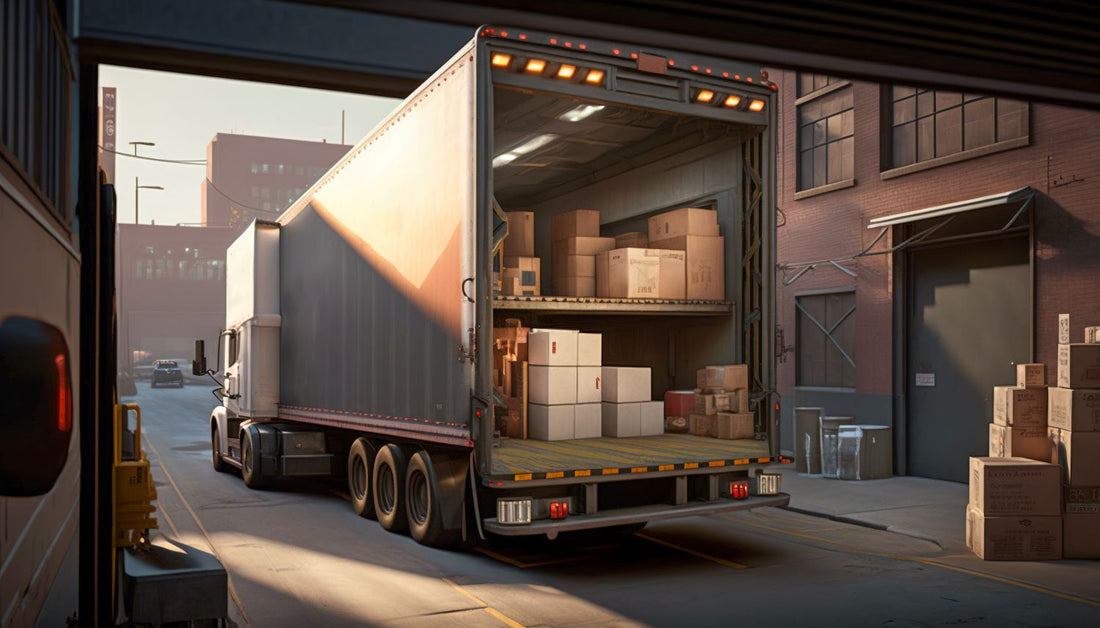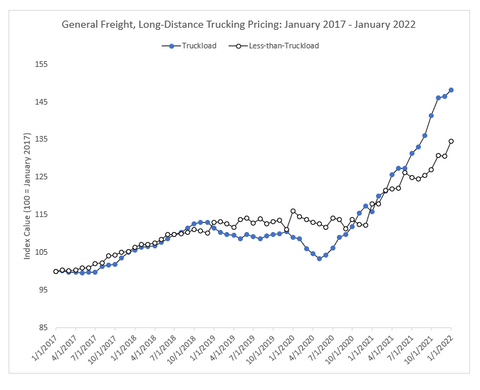
Truckload vs. Less-Than-Truckload (LTL) Freight: What's the Difference?
In the world of trucking and transportation, there are many different shipping varieties available for companies to distribute their goods. Two common options for transporting goods are truckload (TL) and less-than-truckload (LTL) freight shipping.
Both of these methods possess unique advantages and disadvantages for suppliers. Understanding the differences between them helps make for better-informed decisions and more efficient operations. We discuss the differences between these two forms of shipments below, as well as the pros and cons of each type to help you gain a better idea of which method is right for your company.
What is Less-Than-Truckload (LTL)?
LTL freight refers to the mode of shipping where a single truck transports goods from multiple shippers, each with shipments that don't fill an entire truck trailer. In other words, the available space on the truck is shared among several different shippers, each of whom has a relatively small volume of cargo to transport. LTL shipments are typically smaller in size and often used by businesses that don't have enough goods to justify the cost of booking an entire truckload.
- Organize your trailer with our Enclosed Van Trailer Products!
Key Characteristics of LTL Freight:
- Multiple shipments from different shippers were consolidated onto one truck.
- LTL carriers charge based on factors like the weight, dimensions, freight class, and distance traveled for each shipment.
- LTL shipments may involve multiple stops for pickups and deliveries along the route.
- This mode is cost-effective for small to medium-sized shipments and is suitable for businesses with varying shipping needs.

Image from Coyote Logistics.
What is Full Truckload?
Truckload (TL) freight, also known as full truckload (FTL) or over the road (OTR) shipping, involves the transportation of a full truckload of goods from a single shipper or single shipment source to a single destination. With this method, the entire cargo space of the truck trailer is dedicated to the goods of one shipper. TL shipments are typically larger in volume and are commonly used for transporting substantial quantities of goods over longer distances.
Key Characteristics of FTL Freight:
- The entire truck trailer is filled with the shipment of a single shipper, often for a specific destination.
- TL carriers charge based on factors like distance traveled, equipment type, and sometimes other accessorials, but the cost is not shared among multiple shippers.
- TL shipments involve fewer stops and handling compared to LTL, resulting in faster transit times.
- This method is cost-effective for businesses with large and consistent shipping volumes or when shipping goods that require the full capacity of a truck.

FTL vs. LTL: Pros and Cons
Choosing between truckload (TL) and less-than truckload (LTL) freight depends on your specific business needs, shipment size, budget, and timeline.
Some businesses opt to use one method over the other, or even use both methods for efficient shipping. Ultimately, the key to successful logistics lies in selecting the method that aligns best with your business goals and customer expectations. By weighing the pros and cons of each method, you can make a better decision that optimizes your supply chain operations and meets your shipping requirements.
1. Shipment Size & Volume
First, the number of shipments and the frequency of your loads both tend to dictate which method of shipping you plan on using. Large businesses use TL freight to handle their larger quantities of goods that ship at a constant rate. Filling an entire truck trailer requires a LOT of inventory, and while large businesses meet the demands to fill these spaces, other business types may not always maximize their space efficiently, wasting precious dollars in the process. In fact, tech firm Flock Freight studied the freight market industry in 2022 and found that approximately 45% of shippers reported shipping partially empty truckloads, averaging 25 linear feet of unused deck space.
LTL freight, on the other hand, allows you to share the unused trailer space with other small or various sized shipments from other businesses. By sharing the space, you share the cost of transportation with the other shippers as well, making this a more economical option.
 Graph from FreightWaves.
Graph from FreightWaves.
2. Pricing Structure
Additionally, the structures of how you pay for LTL versus FTL are generally different. With truckload freight shipping, companies offer a simple pricing structure with typically straightforward rates. You pay for the space of the truck trailer - all 53+ feet of it - and potentially more depending on the weight of your cargo. Oftentimes, high-volume shippers may negotiate favorable rates with certain carriers.
However, due to the higher upfront cost of the full truckload, this ends up being more expensive than LTL, which involves paying for the amount of space used within a truck trailer. Most times, LTL carriers offer flexible pricing to accommodate various needs as freight loads fluctuate. On the flip side, this pricing method can also get complex, accounting for many more variables than FTL shipping. Overall, both prices for LTL and FTL carriers have increased substantially over the last few years, according to the chart above.
A side note: one consideration to watch out for involves hidden fees. Both shipping methods have the potential for this, so it's important to keep an eye our for these added costs.
3. Transit Time & Reliability
The quickest method for delivering freight is full truckload. TL shipments usually have shorter delivery windows since there are fewer stops along the route. On top of that, TL carriers often provide more precise pickup and delivery times that help both shippers and receivers. With one route and many stops along the way, full truckload shipments span across an average of 400-500 miles per day.
LTL carriers cover an average of 300 miles a day due to having more stops, resulting in extended delivery times. To accommodate this, however, LTL carriers involve themselves in vast networks that cover a wide geographic area to come up with the most efficient way of delivering goods. No matter what, with the added stops, LTL ends up having a lesser predictable delivery schedule with wider time windows.

4. Handling & Risk
Handling plays a pretty significant role in choosing between truckload and LTL freight. Risk of loss, delay, or damage to cargo is always prevalent. Shippers want to feel safe that their chosen shipping method will mitigate the risk of cargo damage during transit.
On the plus side, truckload freight means less handling of the cargo, reducing the risk of damage from handling products. The risk of damage during transit, however, increases with limited control or stopping to ensure cargo remains secure. This is especially true when there isn't enough cargo to fill the truck trailer.
While you see increased handling with LTL freight, it's specialized handling that uses equipment and expertise to handle various types of cargo, including fragile or hazardous materials.
- Handle enclosed trailer cargo much more easily with our Moving Equipment products.
5. Environmental Impact
Lastly, as more fleets and trucking companies become aware of their impact on the environment, the more our methods of shipping goods change.
With full truckload, they have the potential for producing lower emissions per ton-mile. This is when considering the amount of cargo moved per mile. LTL shipments, on the other hand, promote resource-sharing by maximizing their trailer space. However, additional stops and handling can lead to increased fuel consumption and emissions.
Trailer Supplies from US Cargo Control
No matter what type of freight you choose - LTL or truckload - we have the right trailer supplies you need to keep your cargo secure. Using the right enclosed trailer accessories is essential to keeping your cargo safe from damage while on the move. We carry top-of-the-line equipment to safeguard your freight, including:
- E-Track
- L-Track
- Moving Blankets
- Cargo Nets
- Load Bars
- ...& more!
You can also shop by trailer type for supplies catered to specific varieties beyond just enclosed trailers. As always, our product experts are able to help you out with getting the right cargo control equipment you want, when you need it.
More Articles You May Like:
10 Hotshot Trucking Supplies for Successful Deliveries
3 Accessories Every Enclosed Van Trailer Should Have
Void Size: What It Means for Dunnage Bags
